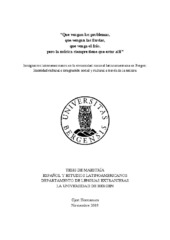| dc.contributor.author | Hermansen, Gjert | |
| dc.date.accessioned | 2019-12-21T03:15:11Z | |
| dc.date.available | 2019-12-21T03:15:11Z | |
| dc.date.issued | 2019-12-21 | |
| dc.date.submitted | 2019-12-20T23:00:03Z | |
| dc.identifier.uri | https://hdl.handle.net/1956/21245 | |
| dc.description.abstract | La presente tesis de maestría es un estudio de caso de la comunidad musical latinoamericana en Bergen, Noruega. Explorando esta comunidad a través de entrevistas con ocho inmigrantes latinoamericanos que son o han sido activos en dicha comunidad, y por observación en tres conciertos con dos grupos que tocan música latinoamericana, la tesis investiga principalmente dos temas. Primero, ¿cómo expresan los inmigrantes la identidad cultural a través de la música? Segundo, ¿qué papel ha jugado el hacer música y el ser parte de una comunidad musical en el proceso de la integración cultural y social de los inmigrantes? Se establece un marco teórico para poder definir y problematizar, entre otros, los conceptos de cultura, identidad cultural, migración, integración social y cultural, comunidad musical, autenticidad y música latinoamericana. El análisis y la discusión que siguen muestran que los informantes sienten que expresan la identidad cultural por la música en varias maneras, y que eso tiene importancia para ellos. Distintos tipos de identidades emergen, frecuentemente en el mismo informante. Algunas identidades son arraigadas en sus países natales (p. ej., chilena o paraguaya) o un grupo cultural (p. ej., andina o mapuche); otros son identidades más amplias y regionales (pan-latinoamericanas o de latinidad) o identidades que se puede llamar globales o cosmopolitas. La autenticidad y la música política (protesta) también aparecen como elementos importantes. En cuanto a la segunda pregunta de investigación, todos los informantes consideran el hacer música y el ser parte de una comunidad musical algo positivo para la integración social y cultural, especialmente en que facilitan los procesos de hacer amigos, crear redes sociales y tender puentes culturales. Algunos, pero no todos los informantes piensan que han aprendido el noruego más rápidamente y mejor como una consecuencia directa del hacer música y el ser parte de una comunidad musical. Identidad latinoamericana (latinidad) y un sentido de una comunidad cultural (y musical) latinoamericana es recalcado por algunos como un “primer paso” positivo en la integración, y los varios espacios creados a través de esto son considerados una herramienta con que se puede conseguir tanto diversidad cultural como integración exitosa simultáneamente. | en_US |
| dc.description.abstract | The present thesis is a case study of the Latin American musical community in Bergen, Norway. Exploring this community through interviews with eight Latin American immigrants who are or have been active in this community, and through participant observation at three concerts with two groups playing Latin American music, the thesis investigates primarily two themes. Firstly, how do the immigrants express cultural identity through music? Secondly, what has been the role of playing music and being part of a music community in the process of social and cultural integration of these immigrants? A theoretical framework is established in order to define and problematize, among others, the concepts of culture, cultural identity, migration, social and cultural integration, music community, authenticity, and Latin American music. The subsequent analysis and discussion show that the informants feel that they express cultural identity through music in various ways, and that this is important to them. Different types of identities emerge, frequently in the same informant. Some identities are rooted in their home country (e.g., Chilean or Paraguayan) or a cultural group (e.g., Andean or Mapuche); others are wider, regional identities (Pan-Latin American or Latino) or identities that can be called global or cosmopolitan. Authenticity and political (protest) music also emerge as important elements. Regarding the second research question, all informants view playing music and being part of a music community as something positive for social and cultural integration, especially in that it facilitates the processes of making friends, creating social networks and bridging cultural gaps. Some, but not all informants think that they have learned Norwegian faster or better as a direct consequence of playing music and being part of a music community. Latino identity (latinidad) and a sense of a Latin American cultural (and musical) community is highlighted by some as a positive ‘first step’ in integration, and the various spaces created through it are seen as a tool with which one can achieve both cultural diversity and successful integration simultaneously. | en_US |
| dc.language.iso | spa | |
| dc.publisher | The University of Bergen | |
| dc.rights | Copyright the Author. All rights reserved | |
| dc.subject | Identidad cultural Integración social Integración cultural Música Música latinoamericana América Latina | |
| dc.title | “Que vengan los problemas, que vengan las lluvias, que venga el frío, pero la música siempre tiene que estar allí” Inmigrantes latinoamericanos en la comunidad musical latinoamericana en Bergen: Identidad cultural e integración social y cultural a través de la música | |
| dc.title.alternative | "Let the problems come, let the rains fall, let the cold bite, but the music must always be there" Latin American immigrants in the Latin American music community in Bergen: Cultural identity and social and cultural integration through music | |
| dc.type | Master thesis | |
| dc.date.updated | 2019-12-20T23:00:03Z | |
| dc.rights.holder | Copyright the Author. All rights reserved | |
| dc.description.degree | Mastergradsoppgave i spansk og latinamerikastudier | |
| dc.description.localcode | MAHF-LÆFR | |
| dc.description.localcode | MAHF-SPLA | |
| dc.description.localcode | SPLA350 | |
| dc.subject.nus | 711128 | |
| fs.subjectcode | SPLA350 | |
| fs.unitcode | 11-20-0 | |
